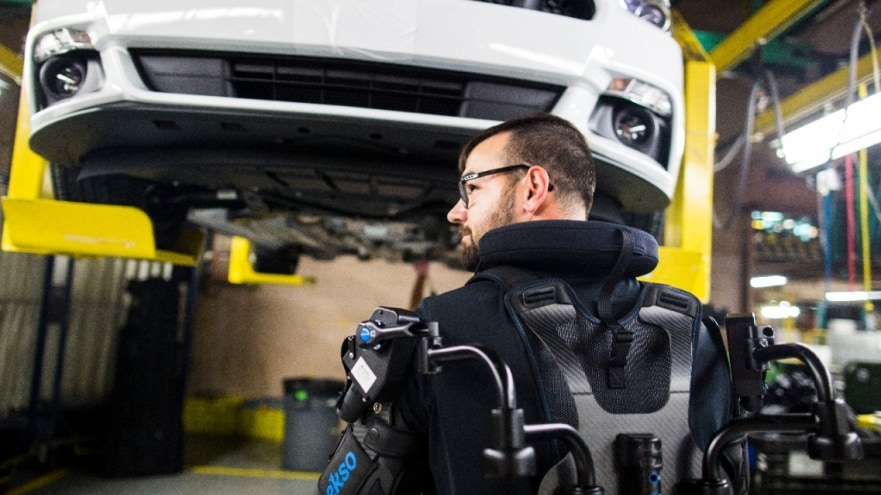- Ford employees in 15 plants globally who perform repetitive overhead tasks now have assistance from a new upper body exoskeletal technology
- EksoVest is the latest example of advanced technology Ford is using to reduce the physical toll on employees during the vehicle assembly process, lessening the chance of worker fatigue, injury or discomfort
- Since 2005, incidents in Ford’s global facilities that resulted in lost time fell 75 percent; the 2018 incident rate was one of the lowest on record
DEARBORN, Mich., Aug. 7, 2018 – Imagine lifting a bag of flour or a watermelon over your head up to 4,600 times a day as part of your job – that is similar to what some Ford employees do every day as they work to build vehicles around the world.
Repetitive motions like those can lead to fatigue and injury for workers, but now Ford is rolling out a new wearable technology globally called EksoVest that helps reduce injury risk in some plant workers after a successful trial in two U.S. plants.
Ford employees in 15 plants and seven countries around the world are able to use an EksoVest to help lessen the physical toll that their job takes on their body. Ford partnered with Ekso Bionics to enhance this wearable technology that elevates and supports a worker’s arms while performing overhead tasks such as reaching up with a power tool to screw bolts to secure the car’s brace – all while standing underneath the vehicle.
“Building vehicles is physically a tough job,” said Bruce Hettle, Ford group vice president, Manufacturing and Labor Affairs. “We care about our employees and are trying to help them do their jobs with the least amount of wear and tear on their bodies possible.”
Read more: See how Ford is using body tracking technology normally used in video games to design less physically stressful workstations for enhanced manufacturing quality.
The EksoVest fits workers ranging from 5 feet 2 inches tall to 6 feet 4 inches tall and provides lift assistance from five pounds to 15 pounds per arm. Ford workers say it’s comfortable because it’s lightweight and not bulky, allowing them to move their arms easily.
“I don’t want the EksoVest to ever leave,” said Nick Gotts, an original EksoVest operator at Flat Rock Assembly, “Any job that’s overhead, I wouldn’t work without it.”
Ford piloted the EksoVest at Michigan Assembly Plant in Wayne, Mich. and Flat Rock Assembly Plant in Flat Rock, Mich., during the past year. The feedback from plant operators helped refine the technology before the company rolled it out globally.
“At Ekso, our mission is to augment human capability with wearable technology and robotics that help people rethink current physical limitations and achieve the remarkable,” said Jack Peurach, president and chief executive officer of Ekso Bionics. “Advancing our collaboration with a global leader like Ford, represents a major step forward in achieving our mission as our EksoVest is deployed around the world to enhance the well-being of its work force.”
All of Ford’s North American assembly plants have EksoVests and they are being used in plants in Asia Pacific, Europe and South America as well. For more information on the Ford and Ekso Bionics partnership, click here.

